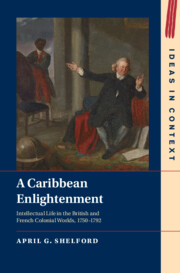Book contents
- A Caribbean Enlightenment
- Ideas in Context
- A Caribbean Enlightenment
- Copyright page
- Dedication
- Contents
- Figures
- Maps
- Tables
- Acknowledgments
- Note on the Text
- Abbreviations
- Chapter 1 What Is a Caribbean Enlightenment?
- Part I Before Breadfruit
- Introduction to Part I
- Chapter 2 Jamaica’s Patrick Browne
- Chapter 3 Birds of a Feather
- Conclusion to Part I
- Part II Creating Enlightened Citizens
- Part III Tristram in the Tropics: or, Reading in Jamaica
- Part IV Cultivating Knowledge
- Bibliography
- Index
Conclusion to Part I
from Part I - Before Breadfruit
Published online by Cambridge University Press: 14 September 2023
- A Caribbean Enlightenment
- Ideas in Context
- A Caribbean Enlightenment
- Copyright page
- Dedication
- Contents
- Figures
- Maps
- Tables
- Acknowledgments
- Note on the Text
- Abbreviations
- Chapter 1 What Is a Caribbean Enlightenment?
- Part I Before Breadfruit
- Introduction to Part I
- Chapter 2 Jamaica’s Patrick Browne
- Chapter 3 Birds of a Feather
- Conclusion to Part I
- Part II Creating Enlightened Citizens
- Part III Tristram in the Tropics: or, Reading in Jamaica
- Part IV Cultivating Knowledge
- Bibliography
- Index
Summary
Part I has demonstrated Jamaican engagement in the study of the Caribbean natural world from the 1740s into the 1760s by reconstructing the careers of two naturalists, Patrick Browne and Anthony Robinson. Many Jamaicans appear in their accounts: the enslaved and the free, White and Black, poor, middling, and wealthy, male and female. Browne and Robinson struggled with intellectual tasks firmly tethered to metropolitan agendas: making Linnaean taxonomy work on the ground, and collating information from publications and their own experience to arrive at a fuller, more accurate account of Caribbean nature. Yet they were also deeply embedded in Caribbean society, and their success depended on local support. This included White male colonists who self-consciously engaged in typical Enlightenment practices while enjoying the benefits of intellectual stimulation and camaraderie. These practices also enabled them to cultivate disciplined and civil identities in a brutal slave society; they constituted them as a purposeful group that could include the scions of a prominent planter family and a pen keeper while excluding the enslaved and the female from their charmed circle of learning.
Keywords
- Type
- Chapter
- Information
- A Caribbean EnlightenmentIntellectual Life in the British and French Colonial Worlds, 1750–1792, pp. 93 - 94Publisher: Cambridge University PressPrint publication year: 2023

